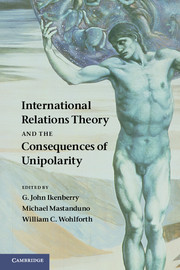Book contents
- Frontmatter
- Contents
- Figures
- Tables
- Notes on the contributors
- Notes on the editors
- 1 Introduction: unipolarity, state behavior, and systemic consequences
- 2 Unipolarity, status competition, and great power war
- 3 Legitimacy, hypocrisy, and the social structure of unipolarity: why being a unipole isn't all it's cracked up to be
- 4 Alliances in a unipolar world
- 5 System maker and privilege taker: US power and the international political economy
- 6 Free hand abroad, divide and rule at home
- 7 The liberal sources of American unipolarity
- 8 Unipolarity: a structural perspective
- 9 Unipolarity and nuclear weapons
- 10 From unipolarity to multipolarity: transition in sight?
- 11 Sell unipolarity? The future of an overvalued concept
- Index
- References
10 - From unipolarity to multipolarity: transition in sight?
Published online by Cambridge University Press: 05 June 2012
- Frontmatter
- Contents
- Figures
- Tables
- Notes on the contributors
- Notes on the editors
- 1 Introduction: unipolarity, state behavior, and systemic consequences
- 2 Unipolarity, status competition, and great power war
- 3 Legitimacy, hypocrisy, and the social structure of unipolarity: why being a unipole isn't all it's cracked up to be
- 4 Alliances in a unipolar world
- 5 System maker and privilege taker: US power and the international political economy
- 6 Free hand abroad, divide and rule at home
- 7 The liberal sources of American unipolarity
- 8 Unipolarity: a structural perspective
- 9 Unipolarity and nuclear weapons
- 10 From unipolarity to multipolarity: transition in sight?
- 11 Sell unipolarity? The future of an overvalued concept
- Index
- References
Summary
Introduction
This volume has three premises: the distribution of power in international politics tells us something important about the patterns and processes of international politics; an unusually concentrated “unipolar” distribution of power emerged with the end of the Cold War; and the unipolar distribution of power is likely to be with us for some time to come.
The purpose of this chapter is to suggest that unipolarity is on the wane and that multipolarity is in sight, to explain why this is happening, and to imagine the dynamics of the emergent multipolar system. First, I offer a definition of polarity. My main observation is that a useful working definition of unipolarity is of necessity very demanding: the “unipole” must be very strong indeed. Second, I briefly offer my own assessment of whether unipolarity is waning and why. I examine a few material indices of polarity, past and present, to suggest that unipolarity may already be on the wane, as the National Intelligence Council recently reported. Here I also address what the arguments presented in the key chapters of the book suggest about the likely behavior of unipolar systems and the durability of unipolarity. Though the introductory chapter asserts “The contemporary structure is extraordinary and has the potential to endure beyond a historical moment,” I will show that the arguments presented in the chapters suggest something else – unipolarity is a strangely “self-abrasive” structure. It will be surprising if it lasts very long. Finally, I will discuss how multipolarity is expected to shape behaviors, and speculate about how some specific present-day material facts, not normally captured in structural arguments, but close cousins, may shape how the next multipolar world will work.
- Type
- Chapter
- Information
- Publisher: Cambridge University PressPrint publication year: 2011
References
- 12
- Cited by



